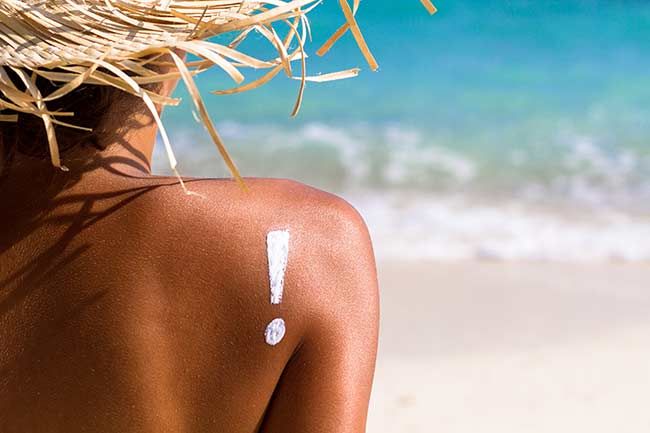Summer breaks are a time for relaxation and rest - but our warm weather getaways can be blighted by health woes caused by heat, unusual food, and different environments. Uh-oh. Never fear, we've gathered our top tips for tackling the most common issues that crop up in the hot weather - no holidays ruined here!
PROBLEM: sunburn
However careful you are, it can be difficult to make it through your holiday without a touch of sunburn. These red, inflamed patches of skin can be very sore, and depending upon severity, can blister and peel.
In the case of sunburn, prevention is better than cure, but if you do end up with sunburn there are some things you can do to reduce damage. Applying aloe vera gel will help to cool the skin - keep the area moisturised, too. Store your body lotion in the fridge so it's ultra-soothing when you apply it. It's important to keep fluids up by drinking plenty of water to help avoid dehydration.
MORE: How to treat sunburn this summer: best tips and tricks
If you're really suffering, take an Aspirin - it won't just relieve the pain, but will also have an anti-inflammatory effect. Avoid the sun while the skin heals and stick to loose clothing so as not to irritate it.
PROBLEM: excessive sweating
Sweating is our body's natural way of keeping us cool. Some people suffer with excessive sweating due to hormone imbalances, certain health conditions or medications. Often, the heat will further exacerbate their symptoms.
Ideally, it's best to wear loose, light, natural fibres, and seek shade during the hottest part of the day. Cooling down with showers, dips in the pool or sea or using a water spritzer can help you feel more comfortable. Keeping hydrated by drinking at least two litres of water is also important. A pharmacist may be able to help with certain soaps and other anti-perspirant products that may help - but always see your GP if it's impacting your daily life.
PROBLEM: prickly heat
Prickly heat, or heat rash, can go hand-in-hand with excessive sweating. The sweat glands become blocked and trapped by an overgrowth of bacteria and dead skin cells, causing inflammation and resulting in an itchy rash.
MORE: 7 natural remedies for hay fever sufferers
Keep the skin clean with water, but avoid any heavy cleansers and perfumed products. Opt for sensitive sun creams when needed, but try to allow the skin to breathe as much as possible. It's best to keep the skin cool, so relax in the shade, wearing loose light fabrics and wear a sunhat whilst walking around. A pharmacist may suggest an anti-histamine or calamine lotion to calm the redness and irritation.
PROBLEM: travellers' tummy
We've all suffered with a dodgy stomach whilst travelling - local strains of bacteria can cause problems due to a lack of antibodies to these particular bacterias in our immune systems. Common symptoms include vomiting, nausea, diarrhoea and abdominal cramps. Chronic diarrhoea can also lead to dehydration.
Most cases will clear up after a few days without treatment, though it's important to keep hydrated - small, frequent sips of water - until it passes. If a baby or young child has diarrhoea, pay close attention to their water intake - it's very important they do not become dehydrated. You could try a oral rehydration solution if you're worried you're at risk of dehydration. Try and get back to solid foods as soon as you feel able.
PROBLEM: urinary tract infections
It has been reported that women visit their GP more frequently with bouts of cystitis during the summer months. A possible cause of this may be an increase in sexual activity, dehydration and warmth. In more than 80% of cases UTIs such as cystitis are caused by the overgrowth of the bacteria E. coli, normally originating from the digestive system.
MORE: 10 tips for a healthy summer 2019
Drinking plenty of water each day which will help to keep urine at an appropriate pH as well as encouraging the bladder to flush out any harmful bacteria regularly. Reducing alcohol, caffeine and sugar from the diet can also help to maintain a healthy bladder, as these can be possible cystitis triggers for some. Natural remedies such as cranberry juice can also be effective. See a doctor if you have blood in your pee, develop pains in your side or a high temperature, sickness or diarrhoea.

